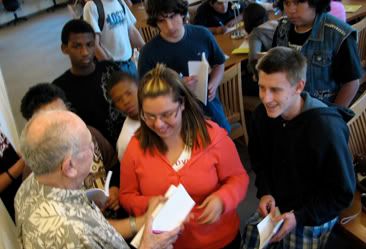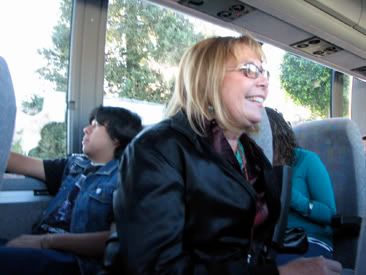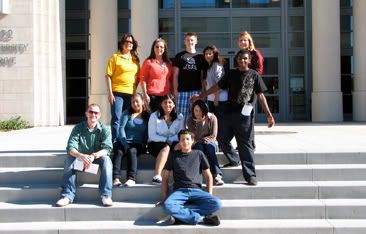
The kids clamored around the old man as if he were a celebrity – they shoved pens and pads into his hands, begging for an autograph. Jack Pariser was eating it up.
“I feel like a rock star!” he laughed, taking another pen and scribbling his name for one teenager after another. A survivor of the Holocaust, he’d just finished telling the students, 9th and 10th graders from Wilson High, his survival tale – a daring and shocking reminder of the brutality exhibited by the Nazis in 1930s Poland. Pariser had run through the night, nearly froze in the forest, even escaped from a jail cell to elude the Third Reich. He spent weeks in a crawl space so small that if he wanted to turn over, so would the other three people who occupied the cramped space.
But today, he is a hero, and nowhere was that more prevalent than on the faces of twenty 15-year olds who were honored to meet him, laugh with him, relate with his message of determination through overwhelming circumstances.

Pariser is swarmed for autographs after speaking to the students.
It was a thrilling finale to their day touring Chapman University – the highly prestigious (and expensive) Orange County college that left the students in awe. They toured the rolling campus and snapped photos of inspiring architecture, then spent hours in the school’s reknowned Holocaust exhibits. The campus oozed history. Students who came hoping to be the first in their family to graduate from high school left asking about admission requirements.
None of this is in Devon Day’s job description, but the English teacher organized this trip and many others like it simply because she saw the opportunity. Day’s mission was to teach her students – many of whom came to her struggling to keep pace, worrying more about getting to and from school safely than their reading assignments – life experiences through writing. So she formed the Long Beach Writers and put her desires into practice.

Devon Day jokes with her students on a recent field trip.
The Long Beach Writers consisted of Day’s most committed students, those who showed dedication to learning and improving. They met during lunch or after school, with the goal of expressing themselves through writing but also of spreading tolerance and acceptance. So Day and her group reached out to others who shared their goals. That was how they found Pariser, and it was how they found Oni Vitandham.
Vitandham is a local author, a survivor of the Khmer Rouge genocide in Cambodia and author of the heavily-acclaimed “On The Wings Of A White Horse,” which details her journey to safety. Vitandham was a picture-perfect example of strength and inspiration through literacy, and she became a kind of mascot for the Long Beach Writers. She embodied their message and their goals. Through “On The Wings Of A White Horse,” the students learned about oppression, freedom, survival. And they related to it, to this self-made woman who rose from an oppressive regime to escape and pursue an education in America, and she related to some of their struggles in the community.
So the writing club evolve into more of a social activism group. They spoke with Vitandham often, organized more group get-togethers and met with other survivors of genocide to continue learning about the necessity of tolerance. They continued a year-long relationship with their pen pals, high school students in tiny Inwood, West Virginia. The students shared stories of their hometowns and tried to envision each other’s worlds. The Wilson students were assigned to read “Rocket Boys” for a taste of West Virginian life, and the Mussellman students read “On The Wings Of A White Horse” and “Homeboyz,” a book by Alan Sitomer which outlined the street life infested with drugs and gangs that many of the Wilson students were forced to deal with each day.
Every day in class, the Long Beach Writers continued their journeys through space and time. They organized and planned a trip to visit their pen pals in Inwood, and continued to meet with Holocaust survivors. In early April, four boys from Musselman High in Inwood came out to visit the Wilson students. They organized barbeques, played soccer together, and enjoyed driving up and down the mythical Pacific Coast Highway. Day took a group of her students along with the Musselman students to Los Angeles for a day at the Museum of Tolerance.
Joining them was Gerda Seifer – a 53-year Long Beach resident and Holocaust survivor – who tagged along from one exhibit to another in her motorized wheelchair, staring intently at the artifacts and nodding along as the tour guide spoke. When it was Seifer’s turn, she captivated the room full of teenagers.
“Mine is just one story out of millions,” she said. “We all have different experiences, but they all end the same way – you either survive or you die.”
Seifer was around the same age as Anne Frank when the Germans came to Poland.
“She died, I survived,” she said.
She survived by relying on her looks, which were different than the idea that Germans had of what a Jewish person looked like. She came to live with a Catholic family and assumed the role of their daughter. She was alive, but without her relatives and without her religion. Without her own life.
“I had to live a lie,” she told the students. “But that didn’t bother me. What bothered me was that I was so alone.”
It was a haunting hour in that room, the elderly survivor bestowing decades of reflection on the teenagers. The gears were turning inside their heads, the students connected Seifer’s story to that of Pariser and Vitandham. All three had spent years telling their stories with the hopes of inspiring others to prevent future atrocities. And now they were entrusting the Long Beach Writers to carry that message. If they had trouble grasping that fact, Seifer left them with a final reminder.
“Be aware of propaganda,” she said. “Always make up your mind. The future is yours.”
They left the museum together, left an eerily-realistic mock concentration camp with barbed wire and roaming search lights, left Seifer’s past and entered the Los Angeles light of the Long Beach Writers’ future. As they walked under it, famous words from fellow survivor Simon Wiesenthal were embedded above the entryway:
“Hope lives when people remember.”

The students who traveled to West Virginia to meet their pen pals, along Wilson teacher Devon Day, Wilson assistant principal Maria Neves and myself.
By Ryan ZumMallen, Managing Editor
